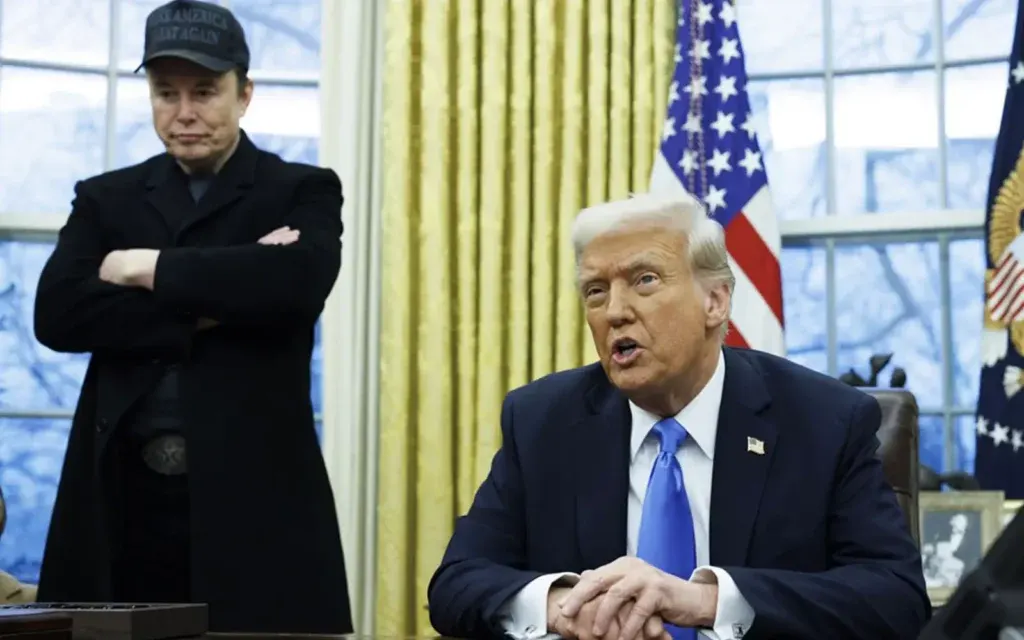Federal Workers Warn: AI Surveillance Censors Criticism of Trump and Musk


At the beginning of January, an unusual alert circulated throughout the halls of the Environmental Protection Agency. This wasn't communicated via formal memos or policy announcements. Rather, it spread as quiet whispers amongst supervisors before being relayed from politically appointed officials to career staff members. Watch your words, watch your typing, and be cautious with your actions.
The alert was not about a fresh set of guidelines for behavior, but rather about a novel form of monitoring supposedly driven by artificial intelligence. This system had been discreetly integrated into an entity overseen directly by Elon Musk himself.
The Department of Government Efficiency (DOGE) has emerged as one of the most contentious tools during President Donald Trump's second term. Established with the aim of cutting down federal expenditures by $1 trillion and rooting out "waste, fraud, and misuse," DOGE has swiftly reshaped the way technology is employed across governmental operations.
However, based on insights from almost 20 people inside and hundreds of pages of court documents examined by Reuters , what’s happening inside DOGE looks less like reform and more like a shadow state.
Surveillance, Algorithms, and Loyalty
The heart of the dispute revolves around allegations that DOGE has utilized artificial intelligence to oversee internal communications within at least one federal department. Sources close to internal conversations at the EPA report that DOGE personnel are deploying technologies designed to analyze Microsoft Teams messages and email contents for indications of attitudes deemed antagonistic towards either Trump or Musk.
"We've been informed that they are searching for language that criticizes Trump or Musk," stated a source who has direct insight into the EPA’s internal guidelines.
Later, EPA officials verified that they were considering AI implementation to "enhance agency operations," although they refuted using it for employment-related choices. Nonetheless, the internal environment within the organization has undergone significant changes. Starting from January, over 600 employees have been put on leave, and the agency is gearing up to reduce its budget by 65%.
Ethics experts say this raises red flags about free speech and political intimidation within federal institutions. Kathleen Clark, a professor at Washington University in St. Louis, put it bluntly. “It sounds like an abuse of government power to suppress or deter speech that the president of the United States doesn’t like.”
Behind Signal and Grok
Secrecy plays a major role in how DOGE operates. Employees often use the encrypted messaging platform Signal for their communication, as it enables messages to self-destruct. This approach might contravene federal regulations regarding record-keeping, which mandate the preservation of records related to official correspondence.
And indeed, this is the same application where former U.S. National Security Adviser Michael Flynn inadvertently added a journalist to a group chat discussing potential American airstrikes in Yemen. It was later revealed that Flynn mistakenly saved the contact information of Jeffrey Goldberg, who serves as the editor at The Atlantic. The Atlantic , with the consent of another person, he planned to include, as stated by three individuals familiar with the situation. The Guardian .
"If they're using Signal without backing up each message to federal records, they are breaking the law," Clark stated.
Increasing obscurity, it is reported that DOGE staff members work together on official documents using shared Google Docs. This approach circumvents standard review processes and record-keeping protocols—uncommon for governmental policies, where modifications are usually documented and trackable.
This behavior is indicative of an overarching trend. Following Musk’s team assuming control of the Office of Personnel Management (OPM) in January, over 100 technical staff members were denied access to crucial cloud systems, encompassing databases with confidential data pertaining to millions of present and past government workers.
As of today, allegedly just two individuals have retained access to that particular set of data: a seasoned federal employee with extensive experience, along with Greg Hogan—a politically appointed official who previously served as an executive at an artificial intelligence start-up and currently holds the position of Chief Information Officer at OPM.
What Is Doge Really Up To?
The extent of DOGE’s technology setup is still hazy. According to insiders, the group has extensively used Musk’s AI chatbot, Grok, as part of their efforts to reduce costs. However, exactly what Grok is accomplishing within these governmental systems is uncertain—even those who work directly with it aren’t entirely sure about its functions.
Musk, holding a distinct governmental employee position, is officially prohibited from leveraging his role for personal gain or advantage to his enterprises. Nonetheless, these boundaries seem to be fading. According to someone privy to Musk’s previous strategies, he had planned to utilize government data to develop "the most advanced AI system possible." This system was thought capable of possibly taking over tasks typically performed by civil servants.
The Trump administration claims that DOGE is not subject to public records laws as it functions within the Executive Office of the President. However, a federal judge did not concur with this stance. On March 10, the court instructed DOGE to start providing records to the oversight organization Citizens for Responsibility and Ethics in Washington. Up until now, no documents have been handed over.
An Experiment Lacking Supervision
For many, the DOGE initiative represents a much-needed update—a push to bring the federal government from its document-heavy yesteryears into the digitized era. There is little argument against the fact that the current governmental computing infrastructure is both antiquated and ineffective.
However, critics caution that modernization is being achieved at the expense of transparency, legal standards, and the protections afforded to civil servants. These detractors argue that the administration is substituting professional bureaucrats with supporters, dismantling established checks and balances, and leveraging advanced technology to advance political objectives.
This goes beyond mere efficiency," Clark stated. "It’s really about power—those who possess it, those who monitor others, and those who find themselves under surveillance.
As DOGE's impact expands across various federal agencies, the boundary between disruptive tech practices and governmental transparency is quickly blurring. Currently, many aspects of DOGE’s operations remain concealed from public scrutiny.
However, the signs — both literal and figurative — are becoming more intense.
This tale initially surfaced on ZME Science . Looking to become smarter each day? Subscribe to our newsletter and keep up-to-date with the newest scientific discoveries.

Posting Komentar untuk "Federal Workers Warn: AI Surveillance Censors Criticism of Trump and Musk"
Please Leave a wise comment, Thank you